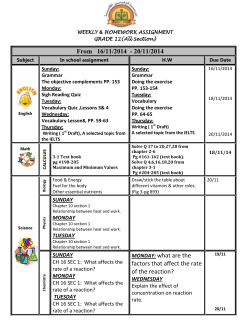
Some things are independent of mind
Realism Some things are independent of mind Tuesday, May 5, 2015 Tuesday, May 5, 2015 Aristotle’s Argument for Realism • If everything were mind-dependent, then, if there were no minds, there would be nothing at all. • • But there could be a universe in which life never developed. Tuesday, May 5, 2015 So, not everything is mind-dependent. Aristotle’s Argument for Realism • Tuesday, May 5, 2015 “And, in general, if only the sensible exists, there would be nothing if animate things were not; for there would be no faculty of sense.” Aristotle’s Argument for Realism • “Now the view that neither the sensible qualities nor the sensations would exist is doubtless true (for they are affections of the perceiver), but that the substrata which cause the sensation should not exist even apart from sensation is impossible.” Tuesday, May 5, 2015 Aristotle’s Argument for Realism • “For sensation is surely not the sensation of itself, but there is something beyond the sensation, which must be prior to the sensation....” Tuesday, May 5, 2015 Aristotle’s Argument • Sensations are sensations of something • Which must be prior to and independent of the sensation itself • So, there are mind-independent causes of sensations: things-in-themselves Tuesday, May 5, 2015 Jorge Luis Borges (1899-1986) Tuesday, May 5, 2015 Magical Realism Tuesday, May 5, 2015 Tuesday, May 5, 2015 Tuesday, May 5, 2015 Tuesday, May 5, 2015 Tuesday, May 5, 2015 Tuesday, May 5, 2015 Tuesday, May 5, 2015 Tuesday, May 5, 2015 Argument for Idealism • Suppose that the world is at least in some respects independent of the mind. • • How could we know anything about it? • We would have no way of knowing which way the world truly is. Tuesday, May 5, 2015 The world might be different, even though all our perceptions and thoughts of it might be the same. Skepticism —> Idealism • • If the world is independent of the mind, we can’t have knowledge of it • Berkeley: “To be is to be perceived.” Tuesday, May 5, 2015 The only way to have knowledge of the world is to treat the world as a mental construction Jorge Luis Borges • Tuesday, May 5, 2015 Tlön: “Hume noted for all time that Berkeley's arguments did not admit the slightest refutation nor did they cause the slightest conviction. This dictum is entirely correct in its application to the earth, but entirely false in Tlön. The nations of this planet are congenitally idealist. Their language and the derivations of their language—religion, letters, metaphysics—all presuppose idealism. The world for them is not a concourse of objects in space; it is a heterogeneous series of independent acts.” The Heresy of Materialism • Tuesday, May 5, 2015 “On Tuesday, X crosses a deserted road and loses nine copper coins. On Thursday, Y finds in the road four coins, somewhat rusted by Wednesday's rain. On Friday, Z discovers three coins on the road. On Friday morning, X finds two coins in the corridor of his house.” The Heresy of Materialism • Tuesday, May 5, 2015 “The heresiarch would deduce from this story the reality — i.e., the continuity— of the nine coins which were recovered. It is absurd (he affirmed) to imagine that four of the coins have not existed between Tuesday and Thursday, three between Tuesday and Friday afternoon, two between Tuesday and Friday morning. It is logical to think they have existed-- at least in some secret way, hidden from the comprehension of men-- at every moment of those three periods.” Missing Explanation Argument Tuesday, May 5, 2015 • • • Realism explains our experiences • • Realism explains this Suppose everything were mind-dependent Why are there regularities in my experiences? Why does your experience align with mine? Idealism has no explanation Best Explanation Argument Tuesday, May 5, 2015 • Realism is the simplest explanation of our experiences • • Suppose the idealist is right • But it’s simpler to suppose they do Suppose things don’t exist, or obey natural laws when we aren’t looking Missing Explanation • • • • Tuesday, May 5, 2015 Pragmatism: the truth is what we all eventually agree on But why do we all eventually agree on, say, p? The realist/correspondence theorist can say, because p is true What can the idealist or pragmatist say? The Realist’s Explanation Tuesday, May 5, 2015 The Realist’s Explanation A cat! Tuesday, May 5, 2015 A cat! The Idealist’s Explanation A cat! Tuesday, May 5, 2015 A cat! The Idealist’s Explanation • A cat! Tuesday, May 5, 2015 Berkeley: The cat is an idea in the mind of God? A cat! The Idealist’s Explanation • Kant: Things-in-themselves, whatever they are? A cat! A cat! ? Tuesday, May 5, 2015 The Idealist’s Explanation • Hegel: Historically conditioned, um, …. A cat! A cat! ? Tuesday, May 5, 2015 The Idealist’s Explanation • A cat! Tuesday, May 5, 2015 Nietzsche: ??? ? A cat! The Idealist’s Explanation • Solipsist: There’s really only one mind here…. A cat! A cat! = Tuesday, May 5, 2015 Movie Analogy • • Tuesday, May 5, 2015 Two theaters are playing the same movie! Explanation? Creeping Idealism • • The fantasy world of Tlön begins invading reality. • • Reality begins to yield. Tuesday, May 5, 2015 Orbis Tertius publishes a version of the encyclopedia of Tlön that catches the public imagination. "The truth is that it longed to yield." Bertrand Russell (1872-1970) Tuesday, May 5, 2015 Idealism’s Confusion Tuesday, May 5, 2015 • Russell: The idealist confuses ideas with things —my idea of the cat with the cat • “And so when Berkeley says that the tree must be in our minds if we can know it, all that he really has a right to say is that a thought of the tree must be in our minds. To argue that the tree itself must be in our minds is like arguing that a person whom we bear in mind is himself in our minds.” Awareness and Object • Tuesday, May 5, 2015 “Taking the word ‘idea’ in Berkeley’s sense, there are two quite distinct things to be considered whenever an idea is before the mind. There is on the one hand the thing of which we are aware – say the colour of my table – and on the other hand the actual awareness itself, the mental act of apprehending the thing. The mental act is undoubtedly mental, but is there any reason to suppose that the thing apprehended is in any sense mental?” Apprehension • Tuesday, May 5, 2015 “Berkeley’s view, that obviously the colour must be in the mind, seems to depend for its plausibility upon confusing the thing apprehended with the act of apprehension.” Argument for Idealism • • • • • Tuesday, May 5, 2015 We have reason to believe that something exists only if we can know it We can know an object only by making it an object of consciousness Any object of consciousness is conditioned by consciousness Anything conditioned by consciousness is mind-dependent So, we have reason to believe that a thing exists only if it is mind-dependent The Realists’ Critique • Premises 3 and 4: • • • Any object of consciousness is conditioned by consciousness Anything conditioned by consciousness is mind-dependent Realists: I see a cat. It becomes an object of consciousness. So, the cat is conditioned by consciousness? So, the cat is mind-dependent? That’s absurd! The cat isn’t affected by my seeing or not seeing it. Tuesday, May 5, 2015 Tuesday, May 5, 2015 Equivocation in Idealism • • • Tuesday, May 5, 2015 G. E. Moore’s “The Refutation of Idealism” The idealists use ‘object of consciousness’ ambiguously Actual objects (causes of perception— things-in-themselves) vs. internal objects (effects— appearances) Equivocation in Idealism Tuesday, May 5, 2015 • We know actual objects by representing them as internal objects • The internal object is conditioned and minddependent; the actual object is neither • Common Sense: “There are at least two material objects in the universe.” Actual Objects Tuesday, May 5, 2015 • Actual objects— things-in-themselves— are not conditioned by being known • But they can be known— by being represented as internal objects, as appearances • Representationalism: We know things-in-themselves by representing them to ourselves as appearances Locke’s Philosophy of Mind Understanding This is a triangle • Idea Appearance Abstraction Perception Thing in itself Tuesday, May 5, 2015 Idealist’s Argument Revised Tuesday, May 5, 2015 • We have reason to believe that something [an actual object] exists only if we can know it • We can know an [actual] object only by making it an [internal] object of consciousness • • • Any [internal] object of consciousness is conditioned by consciousness • But doesn’t mean that the actual object is mind-dependent! Anything conditioned by consciousness is mind-dependent So, we have reason to believe that a thing [an actual object] exists only if there is a mind-dependent internal object. Acquaintance • Tuesday, May 5, 2015 “The faculty of being acquainted with things other than itself is the main characteristic of a mind. Acquaintance with objects essentially consists in a relation between the mind and something other than the mind; it is this that constitutes the mind’s power of knowing things.” Acquaintance and Description Tuesday, May 5, 2015 • I know some things by acquaintance, directly • I know of some things by virtue of someone else’s acquaintance • • I know some things by description None limit me to the mental
© Copyright 2025









